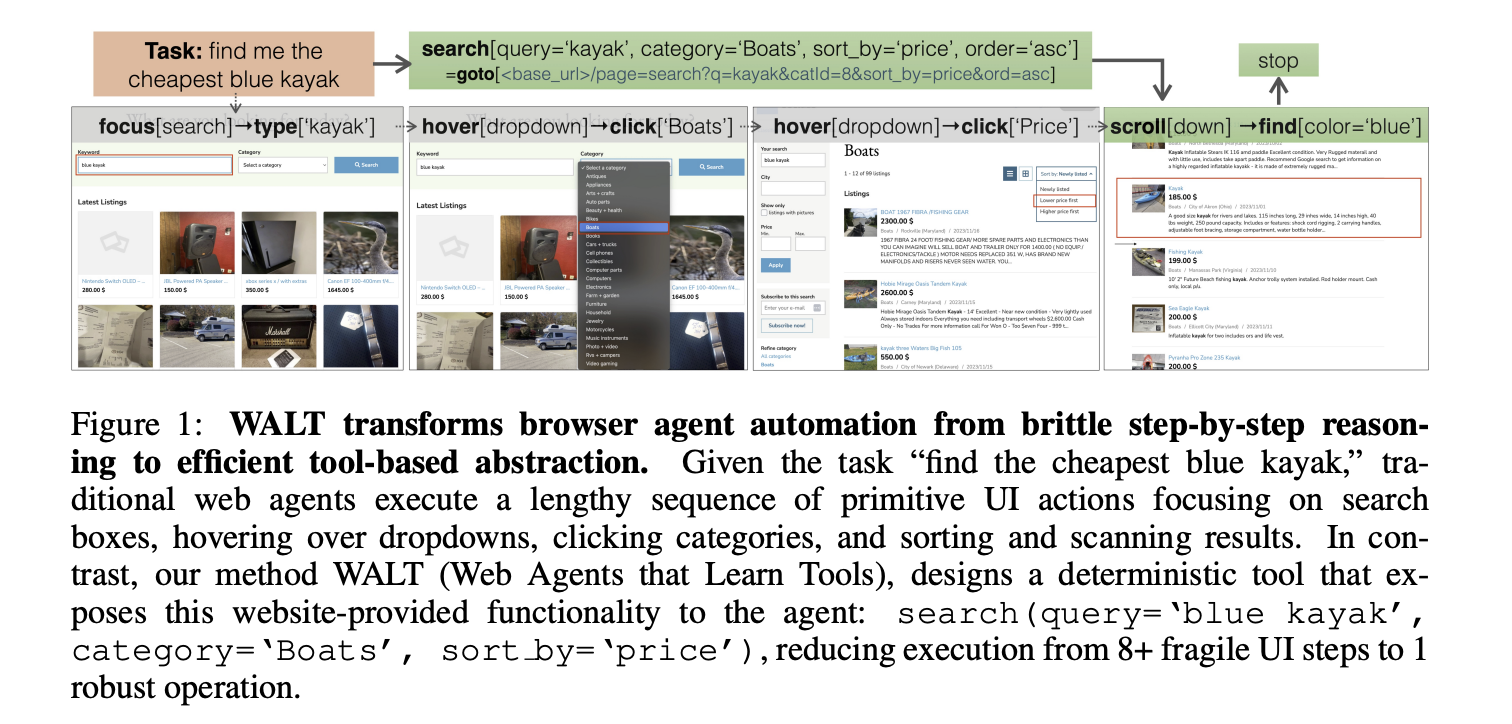A team of Salesforce AI researchers introduced WALT (Web Agents that Learn Tools), a framework that reverse-engineers latent website functionality into reusable invocable tools. It reframes browser automation around callable tools rather than long chains of clicks. Agents then call operations such as search, filter, sort, post_comment, and create_listing. This reduces dependence on large language model step by step reasoning and increases determinism during execution.

What WALT builds?
Web agents often fail when layouts shift or when tasks require long sequences. WALT targets this failure mode by mining site functionality offline, then exposing it as tools that encapsulate navigation, selection, extraction, and optional agentic steps. Tools carry contracts in the form of schemas and examples. At runtime, an agent composes a short program with a few tool calls to complete a task. The design goal is higher success with fewer steps and less reliance on free form reasoning.
Pipeline in two phases
The pipeline has discovery and construction with validation. In discovery, WALT explores a website and proposes tool candidates that map to common goals such as discovery, content management, and communication. In construction and validation, WALT converts traces to deterministic scripts, stabilizes selectors, attempts URL promotion when possible, induces an input schema, and registers a tool only after end to end checks pass. This shifts as much work as possible into stable URL and form operations and leaves agentic grounding for the cases that truly require it.

Results on VisualWebArena and WebArena
On VisualWebArena, WALT reports an average success rate of 52.9 percent with per split results of 64.1 percent on Classifieds, 53.4 percent on Shopping, and 39.0 percent on Reddit. The table lists baselines such as SGV at 50.2 percent and ExaCT at 33.7 percent. Human performance is 88.7 percent on average.
On WebArena, WALT reaches 50.1 percent average across GitLab, Map, Shopping, CMS, Reddit, and Multi. The table shows WALT ahead of prior methods with a nine point margin over the best skill induction baseline. Human performance is 78.2 percent.

Efficiency and ablations
Tools reduce action count by a factor near 1.4 on average relative to a matched agent without tools. On the Classifieds split, ablations show consistent gains when tools are used across different agent backbones. WALT with GPT 5 mini records 7 percent higher success and 27 percent fewer steps, while a human demonstration strategy yields 66.0 percent success. The fully autonomous WALT reaches 64.1 percent with 5 percent fewer steps than the human demonstration case. Multimodal DOM parsing adds 2.6 percent absolute improvement. External verification adds 3.3 percent while increasing checks. Across components, WALT records 21.3 percent fewer steps than baseline policies.

Design choices that enforce determinism
WALT prefers URL level operations when the site exposes query parameters or routes for search and filtering. When pages require dynamic grounding, the tool script inserts bounded agentic steps such as content extraction or wait for page load. Selector stabilization and schema validation reduce drift when sites change. The method keeps the fraction of agentic operations low in discovered tool sets and biases toward deterministic actions like navigation, input, and click.
Key Takeaways
- Approach: WALT discovers and validates website-native functions, then exposes them as callable tools with input schemas, selector stabilization, and URL promotion, reducing brittle step sequences to deterministic operations.
- Results — VisualWebArena: Average success rate 52.9%, with 64.1% on Classifieds, 53.4% on Shopping, and 39.0% on Reddit, outperforming several baselines reported in the paper.
- Results — WebArena: Average success rate 50.1% across GitLab, Map, Shopping, CMS, Reddit, and Multi, showing consistent gains over skill-induction and search-based baselines.
- Efficiency and Ablations: Toolization cuts steps by about 1.4x, with 21.3% fewer actions on average. Multimodal DOM parsing adds +2.6% absolute success, and external verification adds +3.3%.
Editorial Comments
WALT is a useful pivot from step sequence agents to functionality grounded tools. The framework reverse engineers latent website functionality into reusable invocable tools across discovery, content management, and communication. By promoting UI traces to deterministic tools with schema validation and URL operations, WALT lifts web agent success to 52.9 percent on VisualWebArena and 50.1 percent on WebArena, while cutting actions by about 21.3 percent. The release ships a CLI, walt discover, walt agent, and MCP serving for integration.
Check out the Paper and GitHub Page. Feel free to check out our GitHub Page for Tutorials, Codes and Notebooks. Also, feel free to follow us on Twitter and don’t forget to join our 100k+ ML SubReddit and Subscribe to our Newsletter. Wait! are you on telegram? now you can join us on telegram as well.
The post Salesforce AI Research Introduces WALT (Web Agents that Learn Tools): Enabling LLM agents to Automatically Discover Reusable Tools from Any Website appeared first on MarkTechPost.




